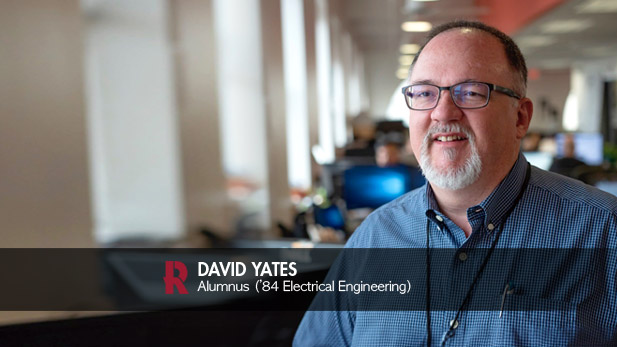Alum David Yates’ Growing List of Surgical Tech Patents Impacting Lives

You will find electrical engineering alum David Yates’ name on 530 patents that have been valued at more than $2.5 billion, and one of his surgical technology innovations is helping approximately four million patients annually.
Few inventors have been as prolific or as impactful to the field of surgical instrument technology as 1984 electrical engineering alum David Yates.
His impressive 530-patent portfolio (with nearly 80 others pending review) ranks 134th among inventors within the United States and 215th worldwide, and is a mark achieved by less than five percent of all living global inventors. Currently, only seven other inventors have had their patents cited more as being relevant to others’ inventions.
Also, Patent Vector has valued Yates’ innovations at more than $2.5 billion and at least one of his products launched on the marketplace is helping an estimated four million surgical patients annually.
“I am not part of some sort of inventor’s ivory tower. People come to me because I can solve problems and integrate technologies to make things work,” said Yates, who has worked with more than 250 unique inventors in six different companies, including noted Johnson & Johnson inventors Frederick Shelton and Jason Harris and several leading medical professionals.
Yates’ groundbreaking inventions have covered such areas as electrosurgery, blood vessel sealing, internal stapling, surgical robotics, electro-mechanics, electro-optics, and circuit design.
Notable recent patents include a method for operating a generator to digitally generate electrical signal waveforms. This invention involves a generator equipped with a processor and memory, which stores two tables defining different wave shapes. By combining the wave shapes, a unique electrical signal waveform is generated and delivered to a surgical instrument, enhancing the precision and efficiency of surgical procedures.
Another significant patent involves control program adaptation based on device status and user input. This patent showcases his commitment to improving surgical systems by incorporating intelligent software that detects system parameters and user inputs to modify the control program accordingly. This adaptive approach allows for enhanced customization and safety within surgical procedures.
Yates’ more than 40-year engineering career has featured taking products from idea to design to implementation to application by a Fortune 50 company, medical device start-up, small-scale partnerships, and sole proprietor environments. He has observed hundreds of human surgical procedures, has extensive experience with evaluating medical device prototypes, federal regulations about medical devices, and consumer markets.
His contributions have come while working with Johnson & Johnson’s Ethicon Endo-Surgery division, GE Medical, Catheter Research, and Cilag International. Meanwhile, Yates’ consulting business in suburban Cincinnati has a client list that includes Johnson & Johnson, Proctor and Gamble, Honeywell Intelligrated, CSAFE Global, and others within medical, industrial, and consumer sectors.
“I have always had the ability to get things done. The fact that what I’m doing is helping others and making a difference is self-rewarding,” said Yates, whose parents were former medical missionaries before setting into living in Terre Haute. Attending Rose-Hulman was a natural fit matching his problem-solving and engineering interests. “I loved circuits and working in the labs with outstanding and caring professors on campus. They molded me and gave me confidence that I could do something with my skills.”
Yates was awarded Johnson & Johnson’s Phillip B. Hoffman Chairman’s Medal in 2014, the highest recognition for technical and scientific achievement within the company, and received the Cincinnati Research & Development Award for “Creating New Ideas That Lead to New Products. He also earned the Rose-Hulman Alumni Association’s Career Achievement Award (2021) and is a senior member of the Institute of Electrical and Electronic Engineers.
“I wasn’t the greatest student at Rose-Hulman, but was able to forge ahead, figure things out, work with others, and persevere. My education launched me on a pathway that I couldn’t have done without a Rose degree,” he said. The experience was so special for Yates that his son, Alan, became a legacy alumnus in 2017 with a degree in mechanical engineering.